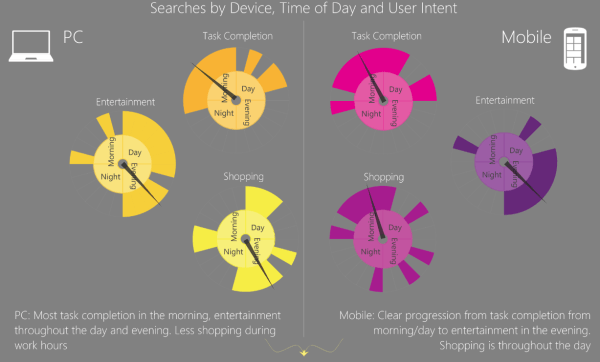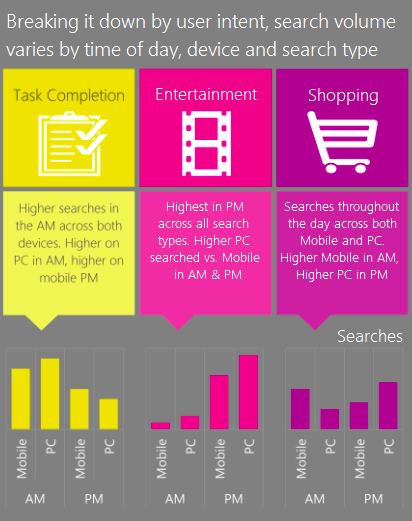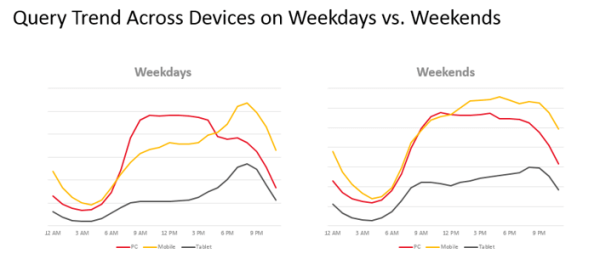Hearing The Rhythms Of Human Search Behavior: What We’ve Learned
Watching people search is great entertainment. It’s not a one-note performance. It’s an all-day, around-the-clock jazz show, with the performers constantly changing their themes, rhythms, even their instruments. Along the way, one gains some great insight into human behavior and how people go about their connected lives. Search marketers that pay attention to this tune […]
Watching people search is great entertainment. It’s not a one-note performance. It’s an all-day, around-the-clock jazz show, with the performers constantly changing their themes, rhythms, even their instruments. Along the way, one gains some great insight into human behavior and how people go about their connected lives.
Search marketers that pay attention to this tune will come away with some big advantages.
Why do I make the analogy to jazz? Because consumer search behavior is extremely varied, but also tends to follow patterns that we can discern, like the way a drummer can anchor a jazz trio while the saxophonist goes off on a wild improvisation.
We also see that consumers change their behavior as they change devices – using PCs for some searches and certain times of the day, mobile devices or tablets for others. Like putting down the bass and moving to piano. By understanding and taking advantage of these variations, advertisers can maximize their ROI and make better use of budgets.
Hour-To-Hour: What People Look For By Device
What’s really interesting to me is to see search terms and patterns shift throughout the day and by device, whether on a mobile device or a PC, as people shift from task completion to shopping to entertainment.
In particular, in the early hours people use their mobile devices to complete a task. At 5:00 a.m., we see people querying on “road conditions” and “java.” Clearly these are people with a long commute who need a jolt of caffeine to get them to work. By 8:00 a.m., “stock market” is a leading search term; at 10:00 a.m. “finance” tops the list. These are people who are thinking about their investments even while they’re at work.
Mobile search continues to change during the day, providing a window on what people are thinking about. At 3:00 p.m., “beauty salons” are a top item. At 5:00 p.m., “potato soup.” Looking good and having something to eat obviously are on people’s minds. Also at 5:00 p.m., “humor” is a top search term, suggesting a need for some comic relief after a long day.
During these morning and afternoon hours, we do see a lot of non-task activity, mainly around shopping. We’ll see popular terms such as “Ace Hardware” or “cheapest airline tickets.” What we don’t find is much searching along the lines of what we refer to as “entertainment.”
That comes later in the day, picking up around 5:00 p.m., the same time “humor” shows up. By 6:00 p.m. searches such as “NFL scores” are popular. At 8:00 p.m. it’s “Downton Abbey,” at 9:00 p.m. “Harry Potter,” and so on.
Searches related to task completion, meanwhile drop significantly. Even shopping tails off compared with mid-morning. Clearly, evening is when people want to use their mobile device for relaxation and to be entertained.
The pattern is a little different with PCs. Here, we see less shopping during work hours (way to stay focused, people!), but entertainment is a key goal throughout the day (OK, losing a little focus here). We’ve seen popular queries at around 6:00 a.m. center on “accounting course” (task completion), “range hoods” (shopping), and “Tomorrowland” (entertainment). A wide spectrum.
That kind of pattern continues through the day, finally shifting at around 5 p.m. What we see after that is task completion-related searches tailing off, with shopping (“comforters”) and entertainment (“Good Wife”) dominating.
The Big Picture: Weekday Versus Weekend
Along with the fine-grain, hour-to-hour search pattern, it’s worth looking at the bigger picture — how search changes day to day and device to device.
For instance, we’ve seen that PC-based searches are strong on weekday mornings, outpacing searches on tablets and mobile devices. When you think about it, this makes perfect sense: on weekday mornings, people are at their desks, searching for work-related issues (and probably a little non-work, too).
But as the day moves along, people head home and relax a little, shifting their searches to mobile phones or tablets. Mobile phones in particular see a sharp jump in searches around 9:00 p.m. One can imagine a user watching a baseball game or primetime TV while searching on their smartphone for some new shoes or a hot new camera. Tablet searches also peak in the evening, while PC-based searches drop significantly.
Search and device patterns are somewhat similar on weekends, but not surprisingly PCs tend to trail off starting shortly after noon, with mobile devices prominent the remainder of the day. You can see that here:
Implications For Advertisers
Advertisers can respond to changing search behavior in several ways. For instance, they should take into account how the patterns between mobile phones and PCs change throughout the course of the day.
If you want to target mobile users, then it’s best to focus on task completion and shopping in the morning, shifting as the day goes by to a mix of shopping and entertainment-related ad bids. For PC-targeted bids, keep in mind that shopping gets hot later in the day. Task completion is important in the morning, and entertainment is strong all day.
In addition, plan your bidding strategy so that you have enough capacity when it counts. Remember that PC searches are strongest mid-day, while mobile searches ramp up through the afternoon and into the evening.
Lastly, be sure to deploy a strategy to find as many searchers as possible. Broad Match modifiers help ensure your ads appear before searchers who use words close to your perfect match, or in a different order. In one search pattern we saw, the phrase “high waisted shorts” appeared. Without Broad Match, that bid opportunity would be lost even though a store might have “shorts with high waists.”
The search-engine marketing world just keeps changing. Evolving search patterns, the continued rapid growth of mobile search, new tools such as Ad Extensions that make it easier to target ads more selectively — all these are a big help to search marketers. Add to that a real understanding of how consumer behavior varies, and search advertising can be more effective than ever.
Opinions expressed in this article are those of the guest author and not necessarily Search Engine Land. Staff authors are listed here.
Related stories


